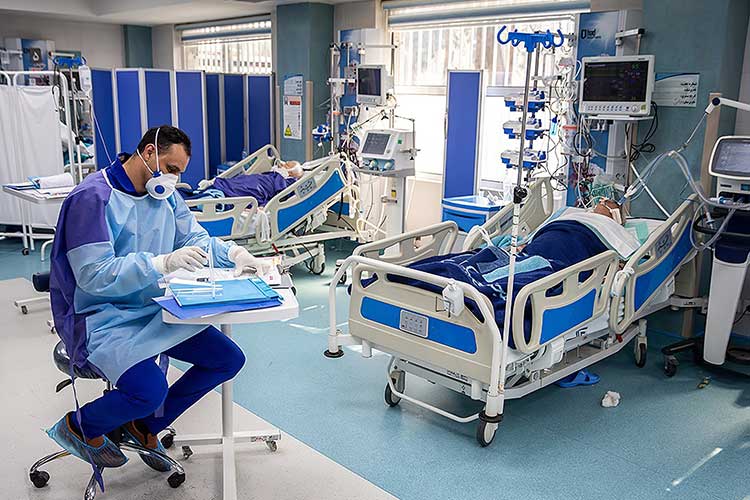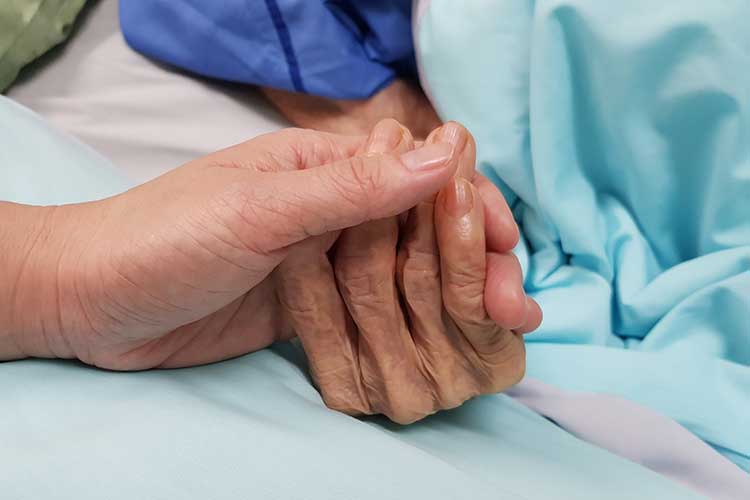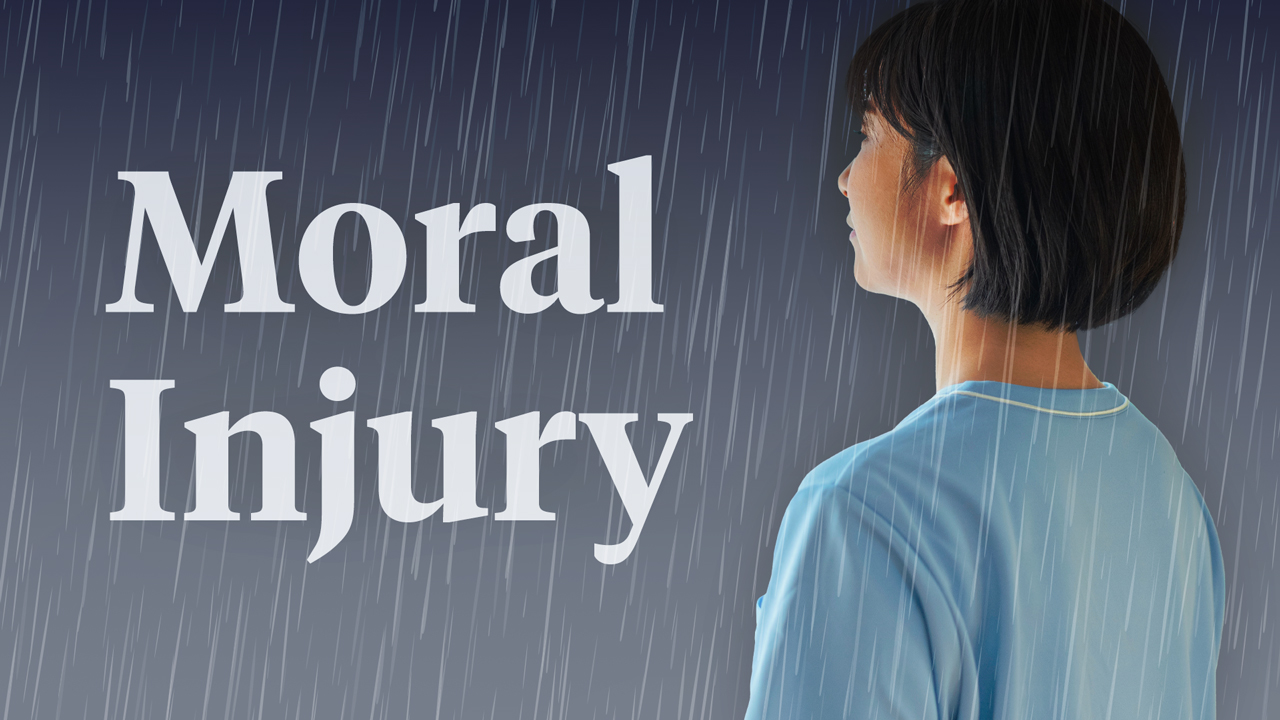What is Moral Injury?
Moral injury is the severe psychological distress that occurs when a person performs actions that violate their moral or ethical code (or fails to take actions in a way that violates their moral or ethical code) (Williamson et al. 2020).
It’s a term that originated from the psychological, social and spiritual distress experienced by military personnel who were involved in events that betrayed their moral code while on deployment (Open Arms 2021).
More recently, however, the concept of moral injury in a healthcare context has started to be explored, especially in light of the COVID-19 pandemic (Sutherland 2022).
For healthcare teams working in overstretched critical care environments, potentially morally injurious events (PMIEs) can lead to negative thoughts as well as deep feelings of shame or guilt, which can, in turn, lead to more serious mental health problems.
While moral injury is not classified as a mental illness, it may be associated with post-traumatic stress disorder (PTSD) or depression (Open Arms 2021).
Symptoms of Moral Injury
A person experiencing moral injury might feel:
- Guilty
- Ashamed
- Sad
- Angry
- Anxious
- Disgusted
- Bad
- Damaged
- Unworthy.
(Open Arms 2021; Norman & Maguen 2025)
They might also:
- Feel they’ve lost faith in others or humanity
- Avoid intimacy
- Question their religious faith
- Engage in self-sabotaging behaviours due to being unable to forgive themselves (e.g. sabotaging relationships because they don’t feel like they deserve them).
(Open Arms 2021; Norman & Maguen 2025)
Moral Injury in ICU Settings
Ideally, in critical care settings, an independent triage officer or team should make decisions about allocating or discontinuing the resources needed for life support (White & Lo 2020).
Moral Injury in ICU Settings Ideally, in critical care settings, an independent triage officer or team should make decisions about allocating or discontinuing the resources needed for life support (White & Lo 2020).
The belief is that separating the triage role from the clinical role can maintain objectivity, avoid conflicts of commitment and minimise the moral distress of the clinical team providing care.
However, when independent triage isn’t available and demand frequently outstrips the supply of essential resources, feelings of frustration and anger over having to deny or ration care can build up over time, leaving the practitioner with a legacy of negative feelings that can be difficult to process.
Under the surface, however, and more difficult to identify, are the feelings that can threaten the very foundation of moral integrity.

Potential Risk Factors for Moral Injury
Epstein and Delgado (2010) theorise that moral distress often occurs when the healthcare worker knows what is best for the patient, but that course of action conflicts with what is best for the organisation, other providers, other patients or society as a whole. For example, when there is:
- Inadequate communication about end-of-life care between providers, patients and families
- Inappropriate use of healthcare resources
- Inadequate staffing, or staff who are not adequately trained to provide the required care.
Williamson et al. (2020) suggest that moral injury is more likely if staff feel unaware or unprepared for the emotional and psychological consequences of decisions, or if the PMIE occurs concurrently with exposure to other traumatic events.
Langley et al. (2015) suggest that sources of moral distress and injury occur within five broad categories of experience:
- Collegial incompetence or inexperience
- Resource constraints
- End-of-life issues
- Lack of consultation, communication and negotiation
- Lack of support.
Psychological Preparedness
Despite enormous efforts to ensure adequate staffing and resources during the COVID-19 pandemic, many healthcare practitioners likely encountered situations where they could not say to a grieving relative, ‘We did all we could’, but rather, ‘We did our best with the resources available, but it wasn’t enough’, and as Greenberg et. al (2020) suggest, that is the seed of a moral injury.
Of course, not everyone will be affected to the same degree, but no one is invulnerable either, which raises the question of psychological preparedness. Williamson et al. (2020) suggest that front-line staff should be made aware of the possibility of PMIEs and the emotions, thoughts and behaviours that might be experienced as a result.
Discussing this topic in advance or taking a ‘nip it in the bud’ approach can help develop psychological preparedness and allow staff to understand some inevitable symptoms of distress. It also facilitates social support, which is known to be generally protective for mental health.
Williamson et al. (2020) also note that psychological screening approaches tend to be ineffective. Instead, they suggest it is imperative for employers to actively monitor staff exposed to PMIEs, facilitate effective team cohesion and make informal, as well as professional, sources of support readily available to their staff.

Moral Residue
A concept similar to that of moral injury is moral residue. It’s a state of mind that arises from times when we have seriously compromised ourselves or allowed ourselves to be compromised by external events (Epstein & Delgado 2020).
In other words, moral wounding can easily occur when a person has to act against their values, often due to constraints beyond their control. The result is a long-lasting ‘moral residue’ that can be damaging to mental health, especially if morally distressing episodes are repeated over time.
Ethical conflicts have always occurred in critical care nursing and have long been associated with burnout and job dissatisfaction. Yet, today, perhaps more than ever, new questions about how to preserve good mental health will need to be asked.
Do nurses need to show more compassion, not just to their patients but also to each other? Furthermore, what more can team leaders or managers do to ensure the necessary level of mental preparedness to work in such challenging intensive care environments?
One answer could be to encourage practitioners to embrace nurturing practices such as meditation and other stress-relieving activities while acknowledging that self-care means something different to each person (Burger 2019).
Conclusion
There used to be a saying years ago: ‘If you can’t stand the heat, get out of the kitchen.’ Luckily, we have come a long way in our understanding of mental wellbeing since then. Perhaps, as Burger (2019) proposes, the term moral injury may well be on course to replace the much-favoured term of ‘burnout’. Others go further by suggesting that moral injury is itself the root cause of burnout and PTSD. Either way, this is a discussion that is only just beginning.

Test Your Knowledge
Question 1 of 3
What is the primary cause of moral injury according to Williamson et al. (2020)?
Topics
Further your knowledge
References
- Burger, CN 2019, ‘What You Need To Know About Moral Injury’, Minority Nurse, 21 October, viewed 5 May 2025, https://minoritynurse.com/what-you-need-to-know-about-moral-injury/
- Epstein, E & Delgado, S 2010, ‘Understanding and Addressing Moral Distress’, OJIN: The Online Journal of Issues in Nursing, vol. 15, no. 3, viewed 5 May 2025, https://ojin.nursingworld.org/MainMenuCategories/EthicsStandards/Resources/Courage-and-Distress/Understanding-Moral-Distress.html
- Greenberg, N, Docherty, M, Gnanapragasam, S & Wessely, S 2020, 'Managing Mental Health Challenges Faced by Healthcare Workers During COVID-19 Pandemic', BMJ, vol. 368, viewed 5 May 2025, https://www.bmj.com/content/368/bmj.m1211
- Langley, G, Kisorio, L & Schmollgruber, S 2015, 'Moral Distress Experienced by Intensive Care Nurses', Southern African Journal of Critical Care, vol. 31 no. 2, viewed 5 May 2025, https://www.researchgate.net/publication/283748612_Moral_distress_experienced_by_intensive_care_nurses
- Norman, SB & Maguen, S 2025, Moral Injury, U.S. Department of Veterans Affairs, viewed 5 May 2025, https://www.ptsd.va.gov/professional/treat/cooccurring/moral_injury.asp
- Open Arms 2021, Moral Injury, Australian Government, viewed 5 May 2025, https://www.openarms.gov.au/signs-symptoms/moral-injury
- Sutherland, D 2022, ‘Moral Injury: What Happens When Exhausted Health Workers can no Longer Provide the Care They Want for Their Patients’, The Conversation, 28 June, viewed 5 May 2025, https://theconversation.com/moral-injury-what-happens-when-exhausted-health-workers-can-no-longer-provide-the-care-they-want-for-their-patients-185485
- White, D & Lo, B 2020, ‘A Framework for Rationing Ventilators and Critical Care Beds During the COVID-19 Pandemic’, JAMA, vol. 323, no. 18, viewed 5 May 2025, https://jamanetwork.com/journals/jama/fullarticle/2763953
- Williamson, V, Murphy, D & Greenberg, N 2020, 'COVID-19 and Experiences of Moral Injury in Front-line Key Workers', Occupational Medicine, vol. 70, no. 5, viewed 5 May 2025, https://academic.oup.com/occmed/article/70/5/317/5814939
 New
New 

